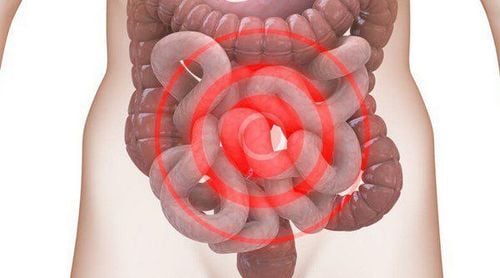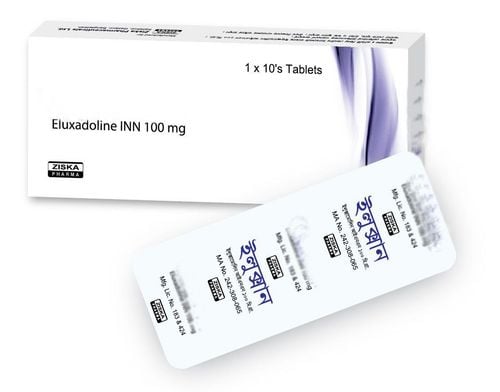This is an automatically translated article.
Post by Master, Doctor Mai Vien Phuong - Gastrointestinal Endoscopy - Department of Medical Examination & Internal Medicine - Vinmec Central Park International General Hospital.
Irritable bowel syndrome is often confused with other gastrointestinal diseases. However, irritable bowel syndrome does not cause permanent damage to the intestines and does not increase the risk of cancer.
1. Symptoms of Irritable Bowel Syndrome
What is the Irritable Bowel Syndrome? This is an intestinal disorder that is recognized by unpleasant symptoms in the gastrointestinal tract. Its symptoms are similar to those of many abdominal problems, some of which can be very serious. Symptoms of irritable bowel syndrome (IBS) tend to be triggered by stress and can get worse after meals. These may include:
Change in bowel habits Watery, hard, lumpy or mucus-containing stools Diarrhea, constipation, or a combination of both Poor bowel movements Abdominal bloating, cramping, excess gas and heartburn or discomfort after eating normal meals Lower back pain Irritable bowel syndrome does not cause permanent damage to the intestines and does not increase the risk of cancer. However, it is very uncomfortable and affects the patient's life. Depending on the severity of your symptoms, irritable bowel syndrome can also disrupt your daily routine.
2. Symptoms not related to irritable bowel syndrome urinating Fever Anemia Colitis Vomiting 3. Distinguishing irritable bowel syndrome from inflammatory bowel disease Irritable bowel syndrome is often confused with inflammatory bowel disease (IBD). Inflammatory bowel disease is a group of chronic or recurrent diseases of the gastrointestinal tract. In inflammatory bowel disease, the immune system misbehaves, attacking the cells in the intestines. The body responds by sending white blood cells to the lining of the intestines, leading to chronic inflammation.
The two most common forms of inflammatory bowel disease are Crohn's disease and ulcerative colitis. Although many of the symptoms are similar to those of irritable bowel syndrome, people with Crohn's and ulcerative colitis are more likely to experience fever, rectal bleeding, weight loss, and decreased appetite. People with inflammatory bowel disease have a higher risk of colon cancer.
Ulcerative colitis can also cause the following:
Bloody stools Anorexia Anemia Skin lesions Joint pain Eye inflammation Liver disorders Early diagnosis is important, as complications can be serious.

4. Distinguish irritable bowel syndrome from cancer? Some types of cancer can cause some of the same symptoms as irritable bowel syndrome. Diagnostic testing can rule these out. Unlike irritable bowel syndrome, colon cancer can cause rectal bleeding, bloody stools, and significant weight loss.
Symptoms of ovarian cancer include loss of appetite and lack of energy. Women with ovarian cancer may notice that their clothes feel tight due to an increased waist circumference.
Such symptoms usually do not appear until advanced stage, which makes early detection very important.
5. Irritable Bowel Syndrome and Other Conditions Other conditions can also produce symptoms similar to irritable bowel syndrome. Example:
Celiac disease : Is a digestive disorder caused by gluten. This is a protein found in barley, rye, and wheat. In addition to other symptoms, celiac disease can cause vomiting, weight loss, and foul-smelling stools. It can also lead to anemia, bone or joint pain, seizures, and rashes. Diverticulosis doesn't always produce noticeable symptoms, aside from bloating. However, diverticula can turn into diverticulITIS, which means areas of the colon can become infected and inflamed causing abdominal pain, fever, chills, and even bloody stools. Endometriosis and irritable bowel syndrome share many of the same symptoms, especially pelvic pain. Endometriosis occurs when hormone-responsive tissues inside the uterus somehow become attached to other areas of the body, usually the intestines. It can lead to cramping, menstrual cramps, pain during intercourse, and bleeding between periods, among other symptoms, depending on where the abnormal endometrial tissue is located. Heartburn tends to cause a burning sensation behind the breastbone, usually after meals, when lying down or bending over. Indigestion can cause discomfort in the upper abdomen, sometimes after eating, but is not related to going to the bathroom. Lactose intolerance means that your body cannot tolerate lactose, the sugar found in milk. According to the National Institute of Diabetes, Digestive and Kidney Diseases, symptoms last 30 minutes to 2 hours after eating dairy products. In addition to bloating and diarrhea, you may also feel nauseous. In summary, irritable bowel syndrome does not have a single cause and can coexist with other conditions that make diagnosis difficult. Other conditions can be confused with irritable bowel syndrome because the symptoms are common.
Please dial HOTLINE for more information or register for an appointment HERE. Download MyVinmec app to make appointments faster and to manage your bookings easily.
References:irritable bowel syndrome diet: What to do and what to avoid. (2016). aboutibs.org/ibs-diet/ibs-diet-what-to-do-and-what-to-avoid.html irritable bowel syndrome vs. Inflammatory bowel disease. (n.d.). crohnscolitisfoundation.org/what-is-ibd/ibs-vs-ibd Inflammatory bowel disease. (2019). cdc.gov/ibd/ Irritable bowel syndrome: What helps – and what doesn’t. (2019). ncbi.nlm.nih.gov/books/NBK279415/ Lactose intolerance. (n.d.). niddk.nih.gov/health-information/digestive-diseases/lactose-intolerance Mayo Clinic Staff. (2019). Colon cancer. mayoclinic.org/diseases-conditions/colon-cancer/symptoms-causes/syc-20353669 Mayo Clinic Staff. (2019). Diverticulitis. mayoclinic.org/diseases-conditions/diverticulitis/symptoms-causes/syc-20371758 Mayo Clinic Staff. (2019). Endometriosis. mayoclinic.org/diseases-conditions/endometriosis/symptoms-causes/syc-20354656 Mayo Clinic Staff. (2019). Ovarian cancer. mayoclinic.org/diseases-conditions/ovarian-cancer/symptoms-causes/syc-20375941 Thompson, W. Grant. (n.d.). Irritable bowel syndrome, Heartburn, Dyspepsia: What's the difference? iffgd.org/publications-library/library/53.html














